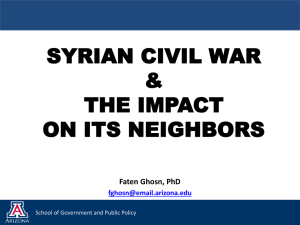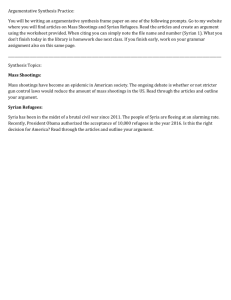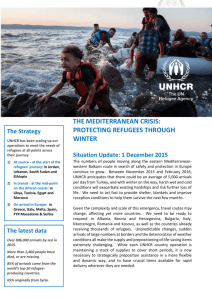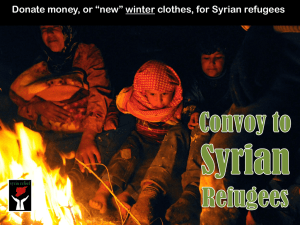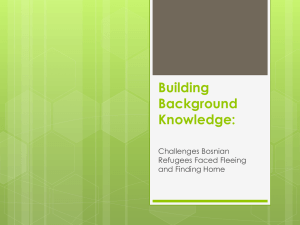Refugees from Syria in Egypt - Amnesty International Canada
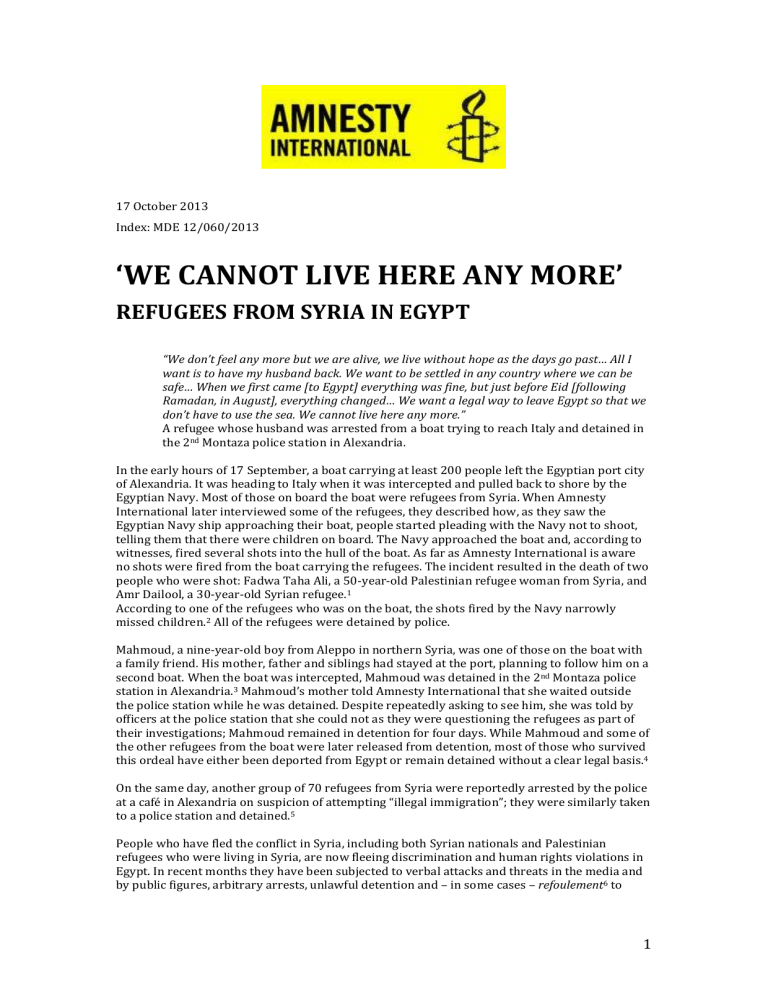
17 October 2013
Index: MDE 12/060/2013
‘WE CANNOT LIVE HERE ANY MORE’
REFUGEES FROM SYRIA IN EGYPT
“We don’t feel any more but we are alive, we live without hope as the days go past… All I want is to have my husband back. We want to be settled in any country where we can be safe… When we first came [to Egypt] everything was fine, but just before Eid [following
Ramadan, in August], everything changed… We want a legal way to leave Egypt so that we don’t have to use the sea. We cannot live here any more.”
A refugee whose husband was arrested from a boat trying to reach Italy and detained in the 2 nd Montaza police station in Alexandria.
In the early hours of 17 September, a boat carrying at least 200 people left the Egyptian port city of Alexandria. It was heading to Italy when it was intercepted and pulled back to shore by the
Egyptian Navy. Most of those on board the boat were refugees from Syria. When Amnesty
International later interviewed some of the refugees, they described how, as they saw the
Egyptian Navy ship approaching their boat, people started pleading with the Navy not to shoot, telling them that there were children on board. The Navy approached the boat and, according to witnesses, fired several shots into the hull of the boat. As far as Amnesty International is aware no shots were fired from the boat carrying the refugees. The incident resulted in the death of two people who were shot: Fadwa Taha Ali, a 50-year-old Palestinian refugee woman from Syria, and
Amr Dailool, a 30-year-old Syrian refugee.
1
According to one of the refugees who was on the boat, the shots fired by the Navy narrowly missed children.
2 All of the refugees were detained by police.
Mahmoud, a nine-year-old boy from Aleppo in northern Syria, was one of those on the boat with a family friend. His mother, father and siblings had stayed at the port, planning to follow him on a second boat. When the boat was intercepted, Mahmoud was detained in the 2 nd Montaza police station in Alexandria.
3 Mahmoud’s mother told Amnesty International that she waited outside the police station while he was detained. Despite repeatedly asking to see him, she was told by officers at the police station that she could not as they were questioning the refugees as part of their investigations; Mahmoud remained in detention for four days. While Mahmoud and some of the other refugees from the boat were later released from detention, most of those who survived this ordeal have either been deported from Egypt or remain detained without a clear legal basis.
4
On the same day, another group of 70 refugees from Syria were reportedly arrested by the police at a café in Alexandria on suspicion of attempting “illegal immigration”; they were similarly taken to a police station and detained.
5
People who have fled the conflict in Syria, including both Syrian nationals and Palestinian refugees who were living in Syria, are now fleeing discrimination and human rights violations in
Egypt. In recent months they have been subjected to verbal attacks and threats in the media and by public figures, arbitrary arrests, unlawful detention and – in some cases – refoulement 6 to
1
Syria. Their situation in Egypt has become so desperate that they are taking the huge risk involved in a sea crossing to Europe.
The dangerous journey, which has been used for years by Egyptians and others, is run by smugglers. Hundreds die attempting to cross the Mediterranean every year. 2011 was one of the deadliest years, with at least 1,500 people loosing their lives while trying to reach Europe from
North Africa.
7 On 3 October 2013, a boat from Libya carrying hundreds of people trying to reach
Europe, sank off the coast of the Italian island of Lampedusa, leaving at least 319 dead.
8
The journey from Egypt’s north coast to Italy – where the boats carrying refugees from Syria are heading – is significantly longer. On 11 October, a boat carrying refugees from Syria and heading to Italy sank off the coast of Alexandria; at least 12 people died and 116 were rescued.
9 According to one report, at least five of those who died were children under the age of 10, including three young sisters.
10 Those who were rescued have been detained in Dekhela and Karmooz police stations in Alexandria.
11
Between January and September 2013, an estimated 6,000 refugees from Syria have managed to reach Italy by sea from Egypt, according to the Office of the United Nations High Commissioner for Refugees (UNHCR), the UN refugee agency. UNCHR has documented a particularly sharp increase in the last few months, with over 3,000 new refugees from Syria arriving by boat in Italy from Egypt since August .
12
Amnesty International has been monitoring the situation for refugees from Syria since early
2013. Since July, the organization has interviewed dozens of refugees from Syria including Syrian and Palestinian refugees. During a visit to Egypt between 7 and 11 October, Amnesty
International met with refugees in Cairo and Alexandria, activists and lawyers working with refugees from Syria, the UNHCR office in Cairo, and civil society organizations. It also visited the
2 nd Montaza police station, one of the locations where refugees are detained.
This report focuses on the arrest, detention and deportation of refugees from Syria in Egypt, particularly following recent incidents in which boats leaving for Europe have been intercepted by the Egyptian authorities off the Egyptian Mediterranean coast. Amnesty International is calling on the Egyptian authorities to immediately halt the unlawful detention and deportation of refugees from Syria who have sought safety on their territory and fulfill their obligations under international law to protect them. Amnesty International is also urgently calling on the international community to resettle refugees, including those unlawfully detained in Egypt after attempting to reach Europe and those who have been forcibly separated from their families due to forced deportations.
MEDIA ATTACKS AND XENOPH|OBIA
“In the name of the Egyptian people, I tell all Syrians living in Egypt, a 48-hour ultimatum, the Egyptian people have all the addresses where you live, those who rent flats and those who live in New Damietta City… and those who live in Sadat City, those who live in 6
October City. All the addresses, the Egyptian people have them and give you a 48-hour ultimatum. If you sit with the Muslim Brotherhood after 48 hours, the people will come out to destroy your houses. Your addresses are all there. The people will come out to destroy your houses.”
Tawfiq Okasha, a famous and influential Egyptian talk show host for the Al Faraeen television channel, on 15 July 2013.
13
Prior to the mass protests that preceded the removal of deposed President Mohamed Morsi,
Egypt had an open-door policy for refugees from Syria. Refugees told Amnesty International that they felt safe and protected. They received assistance from various charitable associations, including help with accommodation and subsistence.
However, in July and August, following Morsi’s removal, some public figures and parts of the mainstream media started accusing Syrians of being supporters of the Muslim Brotherhood and taking part in pro-Morsi demonstrations.
14 On 10 July, a popular TV show host on the ONTV
2
channel, Youssef El Husseini, threatened Syrians who supported the Muslim Brotherhood. He said, “If you interfere in Egyptian affairs, you will take 30 shoes [be beaten up] in the middle of the street.” 15
“My kids can’t play outside anymore. They are cursed by the other kids, told really bad words… There were 1,700 [refugees] living in the area, but now there are no more than
500.”
Syrian refugee in a neighborhood of 6 October City, outside Cairo, interviewed by
Amnesty International on 8 October 2013.
In particular, some media outlets accused Syrians of participating in the Rabaa El Adawiya and
Al-Nahda sit-ins (the largest pro-Morsi sit-ins that started in June and were broken up on 14
August), of carrying weapons, and of attacking civilians and security officials.
16 The media has also linked Palestinians with the Muslim Brotherhood, as well as to unrest in North Sinai - due to alleged links between militant groups in the Sinai Peninsula and Hamas in the Gaza Strip.
17
Most of the refugees to whom Amnesty International spoke said that after the change of power in
Egypt in July and the media attacks against Syrians and Palestinians, conditions turned for the worse.
“Ask any Syrian, they will tell you they wish to find a safe place. We used to think this was a safe place. About a month ago, there was a lot of aggressive harassment and they were telling people to go home.”
Syrian refugee interviewed by Amnesty International on 11 October.
STOPPING REFUGEES FROM ENTERING EGYPT
On 8 July, the new Egyptian government imposed restrictions on Syrian nationals entering Egypt, announcing these were temporary emergency measures.
18 While Syrians did not need visas prior to this date, the new rules require them to obtain an Egyptian entry visa prior to arrival as well as security clearance. These new requirements have effectively meant that Syrians are no longer able to escape to Egypt and, according to UNHCR, arrivals from Syria have nearly stopped.
19
In the weeks following the introduction of the new requirements, planes carrying people from
Syria were sent back from Cairo airport to their points of origin, without anyone being allowed to disembark. These included returns to Damascus and Latakia in Syria, 20 as well as other countries.
UNHCR reported on 26 July that 476 Syrians had been deported or denied entry since these measures were imposed.
21
ARRESTS INSIDE EGYPT
In late July, UNHCR expressed concern at the arbitrary detention of Syrians, including children, by security forces including the army.
22 Dozens were stopped at military and police checkpoints across the country including in Cairo, Alexandria, Ismailia, Suez and Arish. They were either arrested for breaking the curfew or for not having a valid residence permit. Others were reportedly pulled off public transport by police and the military and detained.
23
The military were also preventing Syrians and Palestinians coming from outside Cairo reaching the city, apparently because the government was concerned that they might have joined the pro-
Morsi sit-ins.
24 Those stopped at military checkpoints were either turned back or arrested.
Lawyers working with refugees told Amnesty International that many of the arrests were arbitrary, with no valid reason given.
It is difficult to track all of the arrests of refugees from Syria during July and August, but some numbers have been made public by activists and the UN. According to information available to
Amnesty International, by 19 July 2013 there were at least seven children held in detention centres in Cairo, most of whom were deported, including one child aged 15 who was registered with UNHCR and children whose families remained in Egypt. UNHCR has said that 85 Syrians
3
were arbitrarily detained as of 26 July but never formally charged; 25 on 14 and 15 August, more refugees from Syria were arrested across the country, including in Cairo, Alexandria, Arish and
Ismailia and detained in similar circumstances.
According to UNHCR, the total number of arbitrary arrests and detentions during July and August was approximately 150; around 40 people remained in detention as of early October. UNHCR and activists working with refugees reported that many of those arrested at the time were deported to third countries in the region. UNHCR and its lawyers were not given access to refugees at this time, including those registered with them.
Such arrests appear to have now ended. However, since August, hundreds of refugees from Syria have been arrested and detained as they attempted to leave Egypt by boat.
INTERCEPTIONS AT SEA AND THEIR AFTERMATH
Trying to leave the county
Soon after attacks and threats against Syrians and Palestinians started in the media, many refugees started taking boats from Alexandria to Italy.
26 Refugees who attempted the journey to
Italy, or who have family members who did, told Amnesty International that they paid between
US$2,500 and $3,500 per person to smugglers.
Several refugees from Syria told Amnesty International that they felt compelled to leave Egypt due to the media attacks, arbitrary arrests and worsening public attitude towards them. In reality, Syrian refugees have few options due to the limited number of countries they can enter without having to apply for a visa in advance.
Refugees face further difficulties in leaving the country if their passports have expired. The
Syrian consulate reportedly charges 1,600 Egyptian pounds (US$230) per passport renewal, a steep sum for most refugee families who may have to renew multiple passports. Amnesty
International spoke to a family where some members of the family had passports that were still valid but others’ passports had expired. Rashid, a Syrian refugee, told Amnesty International that it would be a risk to ask the Syrian consulate to renew their passports, as they might not return them.
27
Another Syrian refugee, Zayd, told Amnesty International that he has an eight-month old son who was born in Egypt and does not have a passport. Zayd wants to leave Egypt but is unable to do so because his son does not have a travel document. He told Amnesty International that his passport was expiring in one month and he would then have more difficulties with documents.
28
Interceptions
At the beginning of August, activists and refugee organizations became aware that the Egyptian navy had started intercepting some of these boats on suspicion they were attempting “illegal migration”. At the time of writing, 13 such interceptions are known to have taken place.
29 In all these cases, refugees were reportedly arrested and taken to police stations. According to the latest figures from UNHCR, 946 people have been arrested by the Egyptian authorities while attempting the crossing, 76 were released, 146 deported (of whom at least 46 were children) and
724 – women, children and men – remain in detention.
30
The vast majority of those arrested were accused of attempting “illegal immigration” and had their cases taken to the public prosecution, where a prosecutor ordered their release.
31 Despite this, in nearly all cases they were not released, under orders of Egypt’s National Security agency.
32 Lawyers trying to assist the refugees told Amnesty International that no reasons were given for their continued detention and there was no clear legal basis for it. Those in detention included refugees with Egyptian residence permits or UNHCR cards.
Prolonged detention or deportation
4
Activists and detained refugees 33 told Amnesty International that those detained were given a choice by the Egyptian police of being deported to a country they could enter or remaining in detention indefinitely; with the exception of a few who were released, the vast majority appear to have been forced into this choice. While Syrians are able to enter Turkey, Lebanon and, in a few cases, Jordan, Palestinians can only go to Lebanon, where they are given a 48-hour visa or go back to Syria.
Several detained refugees told Amnesty International they were threatened by the police that, if they did not sign papers accepting deportation, they would be transferred to Al-Khalifa prison in
Cairo where they would be held with criminals in much worse conditions.
34
Lawyers told Amnesty International that they are being prevented from representing refugees detained in the police stations. According to the Egyptian Center for Economic and Social Rights,
Egyptian National Security has refused to provide information on the names of those detained or the deportation orders issued against them. UNHCR has very limited access to refugees, even those registered with the agency, except through some lawyers working with them.
35
While refugees are being offered the choice between deportation and prolonged and unlawful detention, they have also been told they have to pay for their own airline tickets to leave Egypt.
Those who cannot afford to do so face indefinite detention in poor conditions.
Amnesty International has information about cases of unaccompanied children being deported while their families remain in Egypt. In one case that Amnesty International has documented, two brothers aged 15 and 16, both with residency in Egypt, boarded a boat to Europe on the 27
September 2013, without their parents’ knowledge. They were arrested and held at a police station in the Mediterranean city of Rasheed (Rosetta). When their father visited the police station, he was repeatedly told by National Security and the head of the station that the boys would be returned to Syria. On 10 October, the boys were taken to Borg El Arab airport, near
Alexandria, and deported to Lebanon, where they had never been and do not have any relatives.
Their parents went to the airport but were not allowed to see the boys or give them spare clothes before they were deported.
There are also cases of refugee families being forcibly separated in different countries. A Syrian man who was detained in the 2 nd Montaza police station in Alexandria with two of his children after they attempted to leave Egypt by boat told Amnesty International that he was forced to accept deportation to Turkey with his children because the detention was taking a psychological toll on his children; his wife and other children, who had not been arrested, remain in Egypt.
While exact figures are not known, Amnesty International has information that the Egyptian authorities deported hundreds of those who were detained in police stations to Lebanon, Turkey, and in a few cases Jordan – countries that host the largest refugee populations from Syria. In addition, there are two reported instances of collective deportation to Damascus.
36
The first of these deportations to Damascus took place on 26 August and included 35 refugees; they had been detained in Gomrok police station in Alexandria.
37 The Egyptian authorities reportedly gave their passports to the plane’s pilot, who in turn turned them over to the Syrian authorities. The group was reportedly interrogated.
On 4 October a second group made up of 36 people was reportedly deported to Damascus; they had been held in a police station in Rasheed (Rosetta).
38 Nearly all of them are believed to be
Palestinian refugees who were resident in Syria and had mostly fled to Egypt in the last year.
According to refugees who were in contact with some of those sent to Damascus, returned refugees were detained on arrival and held at the Palestine Branch of Syrian Military
Intelligence.
39 Individuals deported told refugees still in Egypt that some were released after several days but there is no information about what happened to them in detention, any conditions that may have been attached to their release, or whether some remain in detention.
40
People detained by Syrian Military Intelligence, including at the Palestine Branch, as well by other intelligence and security agencies, are at high risk of torture and other ill-treatment.
5
Hundreds of actual and suspected opponents of the government of Bashar al-Assad are believed to have died as a result of torture and other ill-treatment in custody since March 2011.
41
The Egyptian authorities’ deportation of refugees to other countries in the region is a blatant disregard for the country’s obligation to provide protection to refugees. These actions run counter to the principles of responsibility sharing that lie at the heart of the international refugee protection regime. Lebanon, Jordan and Turkey all host larger refugee populations from Syria. To put this in perspective, Egypt, a country of more than 85 million people hosts 300,000 refugees from Syria according to government estimates, while Lebanon, whose population is 4.3 million, hosts 800,000 refugees from Syria.
The deportation of refugees to Syria is a blatant violation of Egypt’s obligations under international law, specifically the obligation not to return anyone to a country where they would be at risk of serious human rights violations (the principle of non-refoulement). Egypt is a state party to the 1951 Convention relating to the Status of Refugees (1951 Convention) and the 1969
OAU Convention Governing the Specific Aspects of Refugee Problems in Africa (1969 OAU
Convention). These deportations, made after refugees signed documents accepting deportation, can only be considered forced removals. Refugees were faced with indefinite detention and pressured to accept deportation.
Conditions in detention
Amnesty International visited the 2 nd Montaza police station in Alexandria on 9 October. At the time of the visit, there were around 40 refugees detained there, including 10 children. The youngest of those detained were two one-year old twins; they have been detained since 17
September.
The 2 nd Montaza police station is just one of a number of police stations where refugees are held in and around Alexandria; others are held in Mediterranean towns including Idku and Rasheed.
The police stations lack adequate infrastructure for holding people for long periods.
The police stations do not provide refugees with any food, milk for babies, medical assistance, or other items such as blankets and nappies. Refugees are entirely dependent on donations from charities and individuals outside for these basic necessities. Amnesty International was told by several sources that, even when donations are made, they do not always reach refugees, as police take some of the aid for themselves.
At the 2 nd Montaza police station, men are held separately from women and children. While there were about 40 refugees there at the time of Amnesty International’s visit, more than 150 people had been detained there at one point; refugees reported there was serious overcrowding at the time.
Refugees whom Amnesty International researchers spoke with described the conditions. Because of lack of space people have to sleep on the floor, in the corridors of the station and on the roof without blankets. One woman explained that she had not been able to shower for two weeks as the shower room in the police station is not private, and police officers are able to watch women as they wash. Women told Amnesty that their children have diarrhoea and there are many mosquitoes due to the rubbish and open sewage that surrounds the police station. One refugee family explained that refugees had to ask permission to go to the toilet and that a police officer had verbally insulted the women saying “bad words”.
Some volunteer doctors have been allowed to access refugees in police stations. One doctor whom Amnesty International spoke with described how unsanitary living conditions are leading to many illnesses, predominantly respiratory and skin problems, including scabies. While very urgent medical cases have been referred to hospitals, more long-term serious conditions that require surgery or prolonged treatment are not being referred. Children are most vulnerable to physical and mental health problems, and no physiological support has been provided to those being detained.
6
PALESTINIAN REFUGEES AND ACCESS TO PROTECTION
At least 6,000 Palestinian refugees from Syria are living in Egypt.
42 The Egyptian authorities have had a long-standing unofficial policy of pressuring UNHCR not to consider Palestinian asylum claims, including claims made by those fleeing the conflict in Syria. This leaves Palestinian refugees unable to enjoy international protection in Egypt, in clear violation of Egypt’s international obligations.
There is a common misconception, propagated by the Egyptian government’s refusal to meet its obligations towards Palestinian refugees, that Palestinians are not eligible for refugee protection.
The 1951 Convention excludes from protection Palestinians from receiving assistance and/or protection from UNHCR in areas of operation of the United Nations Relief and Works Agency for
Palestine Refugees (UNRWA) 43 , which consist of Lebanon, Jordan, Syria, the West Bank and Gaza.
However, in Egypt, which is not an UNRWA area of operation, Palestinians are eligible for refugee status under the 1951 Convention 44 . They are also eligible for refugee protection under the 1969
OAU Convention.
This policy by the Egyptian authorities has meant that UNHCR is unable to intervene on behalf of
Palestinian refugees, even when they are sent back to Syria, in violation of the principle of non-
refoulement.
CONCLUSION AND RECOMMENDATIONS
Egypt’s treatment of refugees from Syria is a violation of international law. Hundreds of women, men and children have fled conflict only to be subjected to abuse and discrimination. For some, prolonged arbitrary detention has ended with forced deportation – in some cases back to Syria.
For others their situation has become so desperate that they are risking their life to leave Egypt by sea for Europe.
Amnesty International is making the following recommendations to ensure that the rights of refugees from Syria in Egypt are respected.
To the Egyptian authorities
Unlawful deprivation of liberty
Immediately release individuals arrested on suspicion of attempting “illegal migration” whose release was previously ordered by the public prosecutor and are not being charged with any crime; their continued detention is arbitrary and unlawful.
Ensure that all refugees arrested and detained have access to due process including access to lawyers and families.
Ensure that refugees in detention who require medical care have access to it.
Forcible deportations and refoulement
End all forcible deportations to Syria. The conflict in Syria and the widespread human rights violations, war crimes and crimes against humanity being perpetrated there mean that all those fleeing Syria should be considered refugees under the 1951 Convention or the 1969 OAU
Convention, or both.
End forced deportations of Syrians and Palestinians from Syria to other countries; Egypt has an obligation to provide protection to refugees arriving to its territory.
Ensure that families that have been forcibly separated because of forced deportations of some of the family members are able to reunite, either in Egypt or in a country of their choice.
7
Access to protection
End restrictions on refugees or persons seeking to claim asylum with regard to access to
UNHCR.
Allow Palestinian nationals, particularly those not in possession of permanent or long-term residencies in Egypt, full access to UNHCR, and end restrictions on UNHCR’s ability to fulfill its protection mandate towards them.
Excessive use of force
Ensure security forces do not use excessive force or lethal weapons against unarmed refugees or migrants attempting to leave Egypt unless there is an imminent threat of death or serious injury.
To the international community, in particular member states of the European Union
Substantially increase the number of resettlement places, including emergency resettlement places, over and above annual resettlement quotas, to vulnerable refugees who have fled Syria, and are currently in countries in the Middle East and North Africa region, including Palestinians.
For refugees from Syria in Egypt, urgent attention is needed for refugees unlawfully detained after attempting to reach Europe and those who have been forcibly separated from their families due to forced deportations, in addition to others with particular needs such as refugees with serious medical needs and disabilities.
Consider anyone fleeing Syria to be in need of international protection. The vast majority are likely to be refugees as defined in international law. Refugees from Syria, including Palestinians refugees who resided in Syria, should be able to access refugee protection and the benefits that come with it, a right they have under international law. Key to this is that refugees from Syria should not be disadvantaged by being given a lower humanitarian status, giving them only short residency periods and excluding them from family reunification.
To European states
Ensure interception operations look to the safety of people in distress in interception and rescue operations and include measures that provide access to individualized assessment procedures, including the opportunity to claim asylum.
Ensure search-and-rescue bodies increase their capacity and co-operation in the
Mediterranean Sea, publicly report on measures to reduce deaths at sea, and ensure that searchand-rescue obligations are read and implemented in a manner that is consistent with the requirements of international refugee and human rights law.
ENDNOTES
1 Amnesty International interviews with refugees who had been on the boat, conducted on 8 and 9 October 2013. The deaths were also reported by activists and organizations working with refugees and media organizations. See for example
Two Palestinian refugees killed in emigration attempt from Egypt, online at http://english.ahram.org.eg/NewsContent/1/64/81934/Egypt/Politics-/Two-Palestinian-refugees-killed-in-emigrationatte.aspx
, last accessed on 15 October 2013.
2 Amnesty International interview with refugees on 8 October 2013.
3 Interview with Mahmoud and his family on 8 October 2013.
4 Amnesty International met some of the refugees from the boat while they were in detention in the 2 nd Montaza police station on 9 October 2013. Activists and refugees reported that many of those on the boat had been deported.
5 Egyptian Center for Economic and Social Rights, The Syrian Refugees' Struggle in Alexandria: Between A Rock and a Hard
Place, 4 October 2013, p. 1.
6 Refoulement is the forcible return of individuals to a country when they risk persecution or serious human rights abuses.
Refoulement is strictly prohibited under international law, including under the 1951 Convention Relating to the Status of
Refugees and the 1969 Organization of African Unity Convention Governing the Specific Aspects of Refugee Problems in
Africa.
8
8
7 UNHCR, More than 1,500 drown or go missing trying to cross the Mediterranean in 2011, online at http://www.unhcr.org/4f2803949.html
, last accessed on 15 October 2013.
Online at http://www.bbc.co.uk/news/world-europe-24499890 , last accessed on 14 October 2013.
9 Online at http://english.ahram.org.eg/NewsContent/1/64/83879/Egypt/Politics-/Dozens-dead-in-new-
Mediterranean-migrant-tragedy.aspx
, last accessed on 14 October 2013.
10 Refugee Solidarity Movement, 2 nd Daily report from Refugee Solidarity Movement’s actions; Report on the ship wr[e]ck
incident in Alexandria, online at https://docs.google.com/file/d/1ZVC4oAX6fBLyKRFP7d8KLsHcyY1LMAJ0Ywfn4TpiKvu-
RstixzF5UP5ezMmr/edit?usp=sharing , last accessed on 14 October 2013.
11 Refugee Solidarity Movement, 2 nd Daily report from Refugee Solidarity Movement’s actions; Report on the ship wr[e]ck
incident in Alexandria, online at https://docs.google.com/file/d/1ZVC4oAX6fBLyKRFP7d8KLsHcyY1LMAJ0Ywfn4TpiKvu-
RstixzF5UP5ezMmr/edit?usp=sharing , last accessed on 14 October 2013.
12 UNHCR, Inter-agency Regional Response For Syrian Refugees; Egypt, Iraq, Jordan. Lebanon, Turkey 26 September-2
October 2013, online at http://data.unhcr.org/syrianrefugees/regional.php, last accessed on 16 October 2013.
13 Online at http://www.youtube.com/watch?v=4dsfaRetpuw , last accessed on 11 October 2013.
14 See for example the following media reports about media attacks against Syrians in Egypt: http://www.dailynewsegypt.com/2013/07/18/rights-groups-allege-hostile-campaign-against-palestinians-and-syriansin-egypt/ , http://www.theguardian.com/world/2013/jul/25/syrian-refugees-suffer-backlash-egypt , http://www.nytimes.com/2013/09/08/world/middleeast/in-egypt-a-welcome-for-refugees-turns-bitter.html?_r=0 , last accessed on 15 October 2013.
15 Online at http://www.youtube.com/watch?v=1twdC1DxbO4 , last accessed on 11 October 2013.
Youssef El Husseini and ONTV reportedly later apologized for this, see online at http://english.alarabiya.net/en/News/middleeast/2013/07/25/Syrian-refugees-face-wave-of-racism-in-Egypt-Lebanon.html
, last accessed on 15 October 2013 .
16 Online at http://www.youtube.com/watch?v=34to0Dfer80 , last accessed on 16 October 2013.
17 See for example http://www.youtube.com/watch?v=i9hLhCRPs5M and http://www.youtube.com/watch?v=p-bcW10HViI , last accessed on 16 October 2013.
18 Amnesty International, Egypt Turns away Syrians, online at http://www.amnesty.org/en/news/egypt-turns-awaysyrian-asylum-seekers-2013-07-10 , last accessed on 15 October 2013.
19 Amnesty International meeting with UNHCR Cairo on 7 October 2013.
20 UNHCR, UNHCR concerned at arbitrary detention of Syrian refugees in Egypt, online at http://www.unhcr.org/51f27733540.html
, last accessed on 11 October 2013.
21 UNHCR, UNHCR concerned at arbitrary detention of Syrian refugees in Egypt, online at http://www.unhcr.org/51f27733540.html
, last accessed on 11 October 2013.
22
23
24
Online at http://www.unhcr.org/51f27733540.html
, last accessed on 11 October 2013.
Information collected from UNHCR, lawyers and civil society organizations working with refugees from Syria.
Information collected from lawyers working with refugees from Syria.
25 UNHCR, UNHCR concerned at arbitrary detention of Syrian refugees in Egypt, online at http://www.unhcr.org/51f27733540.html
, last accessed on 14 October 2013.
26 Information obtained from activists working with refugees from Syria.
27 Interview with Syrian refugee (name changed) on 7 October 2013 in Greater Cairo.
28
29
Interview with Syrian refugee (name changed) on 7 October 2013 in Greater Cairo.
Information collected by activists working with refugees from Syria in Egypt.
30 UNHCR, Inter-agency Regional Response For Syrian Refugees; Egypt, Iraq, Jordan. Lebanon, Turkey 26 September-2
October 2013, online at http://data.unhcr.org/syrianrefugees/regional.php
, last accessed on 16 October 2013.
31 Egyptian Center for Economic and Social Rights, The Syrian Refugees' Struggle in Alexandria: Between A Rock and a Hard
Place, 4 October 2013.
32 Egyptian Center for Economic and Social Rights, The Syrian Refugees' Struggle in Alexandria: Between A Rock and a Hard
Place, 4 October 2013.
33
34
35
Amnesty International visited refugees in detention in the 2 nd Montaza police station on 9 October 2013.
Interviews with refugees in detention in the 2 nd Montaza police station on 9 October 2013.
36
Interview with UNHCR on 7 October in Cairo.
Information from activists and lawyers following the cases.
37 Information from refugees who were detained in police stations with some of those deported and from activists and lawyers following the cases.
38 Information from activists and lawyers following the cases.
39 Amnesty International interviews with refugees from Syria on 10 October 2013 in Alexandria.
40 Amnesty International interviews with refugees from Syria on 10 October 2013 in Alexandria.
41 See for example Amnesty International, Syria: Deadly detention: Deaths in custody amid popular protest in Syria http://www.amnesty.org/en/library/asset/MDE24/035/2011/en/874dfa1c-2041-4681-a610dffe1aa1421c/mde240352011en.pdf
42 See UNHCR, Inter-Agency Regional Response for Syrian Refugees: Egypt, Iraq, Jordan, Lebanon, Turkey, 15-21 August
2013, p. 4, online at http://reliefweb.int/report/syrian-arab-republic/inter-agency-regional-response-syrian-refugeesegypt-iraq-jordan-leban-9, last accessed on 15 October 2013.
43 UNRWA was established by United Nations General Assembly resolution 302 (IV) of 8 December 1949 to carry out direct relief and works programmes for Palestine refugees (see www.unrwa.org).
44 For further discussion, see UNHCR, Revised Note on the Applicability of Article 1D of the 1951 Convention relating to the
Status of Refugees to Palestinian Refugees, October 2009, available at http://www.refworld.org/docid/4add77d42.html, last accessed on 15 October 2013.
9
